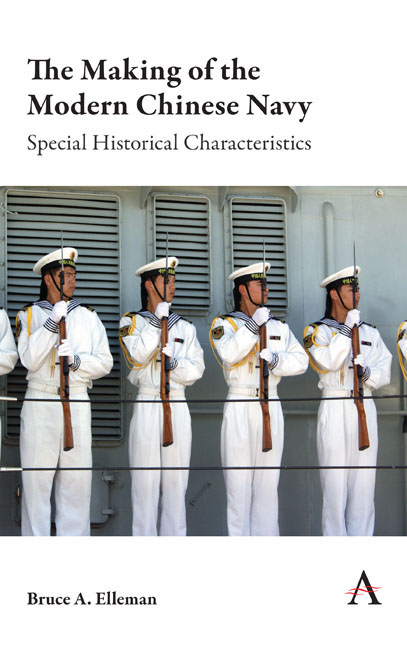Book contents
- Frontmatter
- Contents
- Introduction: The Special Characteristics of China's Maritime History
- 1 Battle of Bạch Đăng River (938)
- 2 Battle of Yaishan (1279)
- 3 Battle of Lake Poyang (1363)
- 4 Ming–Kotte War in Southeast Asia (1410–11)
- 5 Ming Loyalists Flee to Taiwan (1661–83)
- 6 Battle of Chuanbi (1839)
- 7 Sino-French War (1884–85)
- 8 Qing Beiyang Fleet's Defeat in the Battle of the Yellow Sea (1894)
- 9 Chinese Decision to Sink The Nationalist Navy as Blockships (1937)
- 10 Chongqing Mutiny Allowing the PLA to Cross the Yangzi River (1949)
- 11 The Taiwan Strait Crises (1954–55 and 1958)
- 12 China's Decision to Take the Paracel Islands from South Vietnam (1974)
- 13 Missile Blockade: The Taiwan Strait Crisis (1995–96)
- 14 The EP-3 Standoff and Diplomatic Resolution (2001)
- Conclusions: The Influence of History on the Formation of a Modern Chinese Navy
- Selected Bibliography
- Index
6 - Battle of Chuanbi (1839)
Published online by Cambridge University Press: 04 October 2019
- Frontmatter
- Contents
- Introduction: The Special Characteristics of China's Maritime History
- 1 Battle of Bạch Đăng River (938)
- 2 Battle of Yaishan (1279)
- 3 Battle of Lake Poyang (1363)
- 4 Ming–Kotte War in Southeast Asia (1410–11)
- 5 Ming Loyalists Flee to Taiwan (1661–83)
- 6 Battle of Chuanbi (1839)
- 7 Sino-French War (1884–85)
- 8 Qing Beiyang Fleet's Defeat in the Battle of the Yellow Sea (1894)
- 9 Chinese Decision to Sink The Nationalist Navy as Blockships (1937)
- 10 Chongqing Mutiny Allowing the PLA to Cross the Yangzi River (1949)
- 11 The Taiwan Strait Crises (1954–55 and 1958)
- 12 China's Decision to Take the Paracel Islands from South Vietnam (1974)
- 13 Missile Blockade: The Taiwan Strait Crisis (1995–96)
- 14 The EP-3 Standoff and Diplomatic Resolution (2001)
- Conclusions: The Influence of History on the Formation of a Modern Chinese Navy
- Selected Bibliography
- Index
Summary
Manchu versus Han tensions often resulted in military defeat at foreign hands. One of the strangest encounters between the British and Chinese during the first Opium War was the Battle of Chuanbi. On November 3, 1839, Volage and Hyacinth faced off and defeated 16 Han Chinese–manned war junks attempting to defend a foreign merchant ship that had signed the Manchu anti-opium pledge. Unlike the rather ambiguous results of an earlier encounter, in this naval battle the two British sailing ships used their maneuverability before the wind to “slip and cut” among the slower Chinese junks, all the while “delivering broadsides as they ran.” In the end the Royal Navy defeated the Qing by blockading the Yangzi River, thus threatening to starve out the Manchu court in Beijing. Han Chinese merchants in the South mainly profited from this victory. PRC historians agree that the Manchus were bad rulers, but still condemn the British for winning the Opium Wars rather than portraying the conflicts as a joint Han–British victory over the Manchus.
Summary of the Battle of Chuanbi
In September 1836, the Qing Emperor, Daoguang, ordered the governor-general in Guangzhou to eliminate all opium imports. China had initially prohibited the smoking of opium in 1729, and had then outlawed its growth and importation in 1796, but these laws were never enforced. As a result, there was a large domestic opium trade in China. By the 1830s, millions of dollars in silver were also being shipped out of China every year, primarily by British traders in return for the importation of high-quality Indian opium. So long as China retained a foreign trade surplus, the Qing emperors had ignored opium imports. But once the silver drain became too severe, their decision to ban foreign opium suddenly became a top priority.
For a time, the Qing government toyed with legalizing opium imports and imposing a tariff similar to other foreign medicines. But, this solution would strengthen not weaken the already wealthy Han Chinese merchant class in South China, who sought greater autonomy from Beijing. Domestic Han–Manchu tensions perhaps convinced the Daoguang Emperor to “kill two birds with one stone,” by trying to eliminate at one stroke both the foreign threat— the opium traders— and the domestic threat— Han Chinese merchants.
- Type
- Chapter
- Information
- The Making of the Modern Chinese NavySpecial Historical Characteristics, pp. 29 - 34Publisher: Anthem PressPrint publication year: 2019



